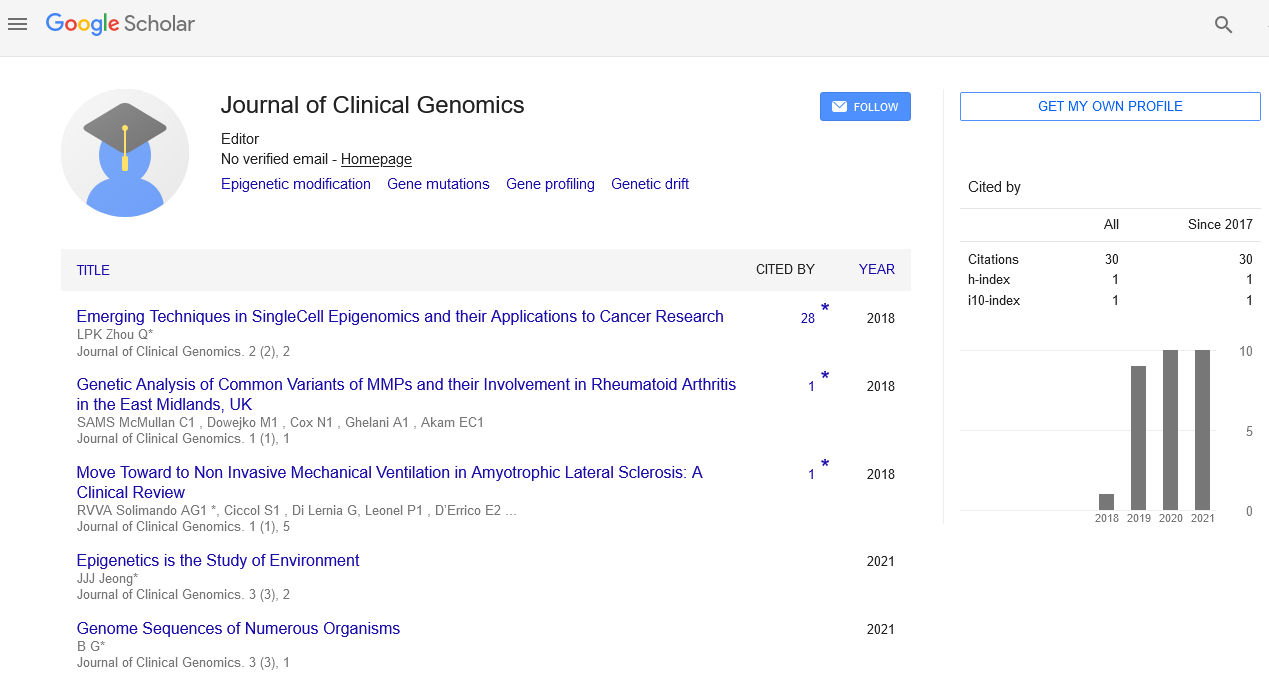Short Communication, J Clin Genom Vol: 5 Issue: 2
Epigenetic Changes in Response to Environmental Exposure
Sara Rafferty*
1Department of Genomics, University of New South Wales, Kensington, NSW, Australia
*Corresponding Author: Sara Rafferty,
Department of Genomics, University of
New South Wales, Kensington, NSW, Australia
E-mail: sara@rfty.au
Received date: 23 May, 2023, Manuscript No. JCG-23-107434;
Editor assigned date: 26 May, 2023, PreQC No. JCG-23-107434 (PQ);
Reviewed date: 12 June, 2023, QC No. JCG-23-107434;
Revised date: 19 June, 2023, Manuscript No. JCG-23-107434 (R);
Published date: 26 June, 2023 DOI: 10.4172/JCG.1000125
Citation: Rafferty S (2023) Epigenetic Changes in Response to Environmental Exposure. J Clin Genom 5:2.
Description
Epigenetic modifications refer to heritable changes in gene expression that occur without alterations to the underlying DNA sequence. These modifications play a crucial role in regulating gene activity and cellular identity. While genetic factors are fundamental, environmental factors influences shape of epigenome, acting as powerful modulators of gene expression. Environmental influences encompass a wide range of factors, including diet, stress, pollution, lifestyle choices, and exposure to chemicals. These factors have been found to induce epigenetic modifications that can persist throughout life, affecting gene expression patterns and potentially influencing disease susceptibility. For example, studies have demonstrated that a high-fat diet can induce changes in DNA methylation patterns, thereby altering the expression of genes involved in metabolism. Similarly, chronic stress has been linked to epigenetic modifications that affect genes associated with the stress response and mental health [1-4].
Moreover, exposure to environmental toxins and pollutants has emerged as significant contributors to epigenetic modifications. Chemical substances found in air pollution, pesticides, and industrial products have been associated with alterations in DNA methylation and histone modifications. These changes can influence the expression of genes involved in various health conditions, including respiratory disorders, cardiovascular diseases, and cancer. The impact of environmental toxins on the epigenome highlights the importance of minimizing exposure and adopting sustainable practices to safeguard health and the environment. Early-life experiences are particularly important in shaping the epigenome. During early development, the epigenome is more susceptible to environmental influences, leading to long-lasting effects on gene expression patterns. Adverse early-life experiences, such as neglect, abuse or exposure to toxins which can induce epigenetic modifications that impact cognitive function, emotional well-being, and overall health. Studies have shown that children who experienced maltreatment exhibit alterations in DNA methylation patterns in genes associated with stress response and brain development [5-7].
Conversely, positive early-life experiences, such as nurturing caregiving can promote healthy epigenetic modifications and support optimal development. The presence of a secure and supportive environment in early childhood has been associated with positive epigenetic changes in genes involved in emotional regulation and cognitive function. These findings emphasize the importance of providing a nurturing environment during critical developmental periods to optimize the epigenetic landscape and ensure healthy outcomes [8].
Lifestyle choices also have profound effects on epigenetic modifications. Regular physical activity has been shown to induce favorable epigenetic changes that enhance overall health. Exercise has been associated with alterations in DNA methylation patterns, particularly in genes related to metabolism, inflammation, and oxidative stress. These modifications contribute to improved cardiovascular function, enhanced metabolism, and reduced risk of chronic diseases. Exercise-induced epigenetic modifications demonstrate the potential for lifestyle interventions to positively impact on genetic destiny. Smoking, excessive alcohol consumption and drug abuse have been shown to induce epigenetic changes that increase the risk of various diseases and impair overall well-being. For example, smoking has been associated with DNA methylation changes in genes related to lung cancer and cardiovascular diseases. The epigenetic consequences of unhealthy lifestyle choices highlight the importance of promoting healthy behaviors and preventing harmful habits to maintain optimal epigenetic patterns [9,10].
Conclusion
Furthermore, the field of epigenetic epidemiology aims to investigate the cumulative effects of environmental influences on the epigenome across populations. Large-scale studies have identified associations between environmental exposures, such as air pollution or prenatal nutrition, and epigenetic modifications in specific genomic regions. These findings contribute to understanding environmental factors that shape the epigenome on a broader scale and their potential implications for public health interventions.
References
- Xu R, Li S, Guo S, Zhao Q (2020) Environmental temperature and human epigenetic modifications: A systematic review. Environ Pollut 259:113840.
[Crossref] [Google Scholar] [PubMed]
- Sweatt JD (2009) Experience-dependent epigenetic modifications in the central nervous system. Biol Psychiatry 65:191-197.
- Cropley JE, Suter CM, Beckman KB, Martin DI (2006) Germ-line epigenetic modification of the murine Avy allele by nutritional supplementation. Proc Natl Acad Sci 103:17308-17312.
- Boyko A, Kovalchuk I (2011) Genome instability and epigenetic modification heritable responses to environmental stress? Curr Opin Plant Biol 14:260-266.
- Herman JJ, Spencer HG, Donohue K, Sultan SE (2014) How stable ‘should’ epigenetic modifications be? Evolution 68:632-643.
- Shao C, Li Q, Chen S, Zhang P, Lian J, et al. (2014) Epigenetic modification and inheritance in sexual reversal of fish. Genome Res 24:604-615.
- Milagro FI, Mansego ML, De Miguel C, Martínez JA (2013) Dietary factors, epigenetic modifications and obesity outcomes: Progresses and perspectives. Mol Aspects Med 34:782-812.
- Le Luyer J, Laporte M, Beacham TD, Kaukinen KH, Withler RE, et al. (2017) Parallel epigenetic modifications induced by hatchery rearing in a Pacific salmon. Proc Natl Acad Sci 114:12964-12969.
- Conching AK, Thayer Z (2019) Biological pathways for historical trauma to affect health: A conceptual model focusing on epigenetic modifications. Soc Sci Med 230:74-82.
- Saavedra K, Molina-Márquez AM, Saavedra N, Zambrano T, Salazar LA (2016) Epigenetic modifications of major depressive disorder. Int J Mol Sci 17:1279.
 Spanish
Spanish  Chinese
Chinese  Russian
Russian  German
German  French
French  Japanese
Japanese  Portuguese
Portuguese  Hindi
Hindi 